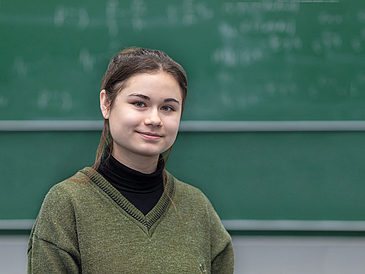When talking about the early studies program at the University of Bremen, Adela Talipov is keen to stress what really matters. “You don’t have to be a genius to take part,” Adela says. She adds that curiosity and showing interest are much more important. And this is particularly true for the subjects in science and technology that she is studying. At her high school, Gymnasium Vegesack, the 17-year-old is in the 11th grade and has chosen to do advanced courses in mathematics and physics. She had already gained her first insights into research at the University of Bremen by attending a student academy last summer. So deciding to take part in the early studies program was the natural next step.
Insights into Experimental Physics
Adela found out more about the program at an info day and chose a lecture on experimental physics from the courses on offer. As well as choosing what to study, Adela had to consider practical matters. “I wanted to miss as little class as possible at school,” she says. For example, her schedule for Friday revolves around physics. After her lecture from 8 a.m. to 10 a.m., she goes back to high school for physics classes. However, it’s not always possible to make it to every lesson, meaning she has to catch up on what she has missed in geography and economics classes in her own time.
She attends the lectures with regular university students and other students on the program. Among other things, she is learning how to determine the radius and frequency of vibrations. While the topic may sound abstract to some, it is a common phenomenon encountered in everyday life, for example with the movement of swings or the sound produced by musical instruments. At the end of the semester, Adela could take an exam on the subject and have the achievement credited to a later degree. Yet at this time, this is something she is not taking into consideration. “I don’t want to put any extra stress on myself, but rather to find out how my studies are going and whether it’s an option for me.”
Help from Fellow Students, School, and University
When comparing teaching at school and university, Adela sees a major difference in the pace at which subject matter is dealt with. In addition, some of the lecture content is based on concepts that she has yet to cover at school, such as integral calculus. “It may look a little intimidating at first glance, but it’s not really that complicated,” she says. If she doesn’t understand something, she can ask her physics teacher for help. The students on the early studies program also provide her and each other with support.
At the University of Bremen, she also became aware of the Drop Tower Project for School Students, or “DroPS.” At the Center for Applied Space Technology and Microgravity, high-school students have the opportunity to carry out experiments in the Drop Tower. Adela teamed up with the other physics-loving students from the early studies programs. Building on their knowledge of experimental physics, the team’s idea experiments with strong sound waves, such as those produced by jukeboxes. These kinds of sound waves can cause water to vibrate – but what happens when the experiment is carried out in zero gravity? The young students have six months to get to the bottom of this question with assistance from researchers at the university.
Advice for Prospective Students: “Definitely Give it a Try!”
Together with other students from her school, Adela also takes part in the CanSat competition, which involves participants building their own minisatellites and carrying out measurements with them. That aside, she has regular lessons at the school, her work as a student representative, and a part-time job as a waitress. Adela still has plenty of time to relax and for her friends, which is why she wants to continue the early studies program in the upcoming semesters. “I find physics interesting, but it isn’t the only subject I want to study,” she says. She is particularly interested in the interrelation between different disciplines such as mathematics, physics, and chemistry. That is why she is already planning to attend courses in chemistry or materials science. “Definitely give it a try,” says Adela, when advising other young people who are toying with the idea of doing an early studies program. “Not only do you learn more about different subjects, you also meet lots of interesting people.”

